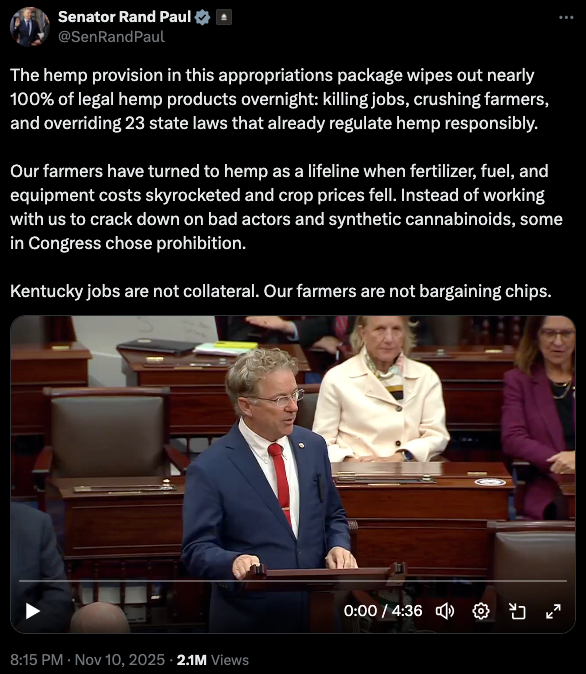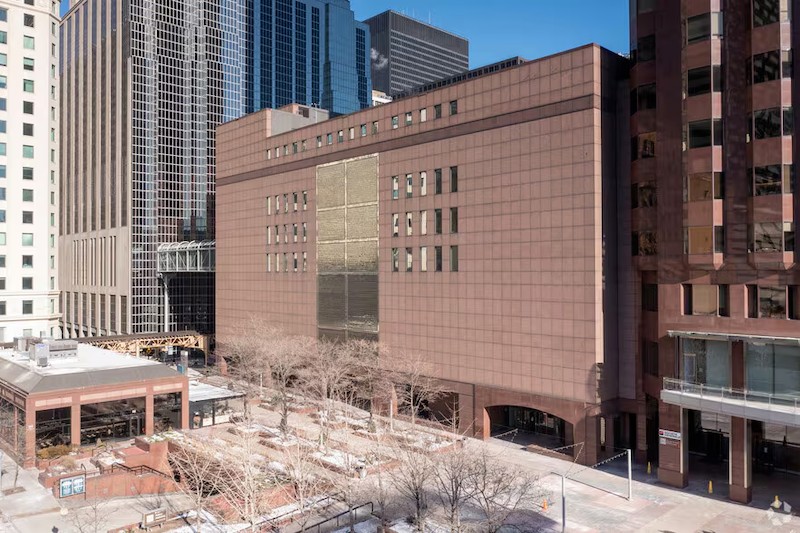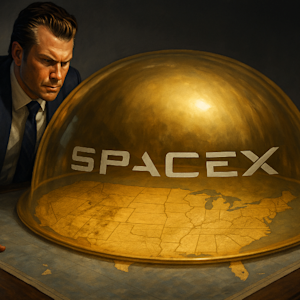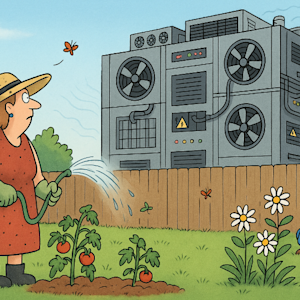Buck Sexton: NYC’s Uncertain Future
![]() Blessed Are the Inept
Blessed Are the Inept
 “Now that Mamdani’s actually won, the No. 1 question I’ve been getting is: ‘What happens to New York?’” recounts Buck Sexton — the No. 1 voice in conservative talk radio and former CIA officer.
“Now that Mamdani’s actually won, the No. 1 question I’ve been getting is: ‘What happens to New York?’” recounts Buck Sexton — the No. 1 voice in conservative talk radio and former CIA officer.
Before answering that, he offers some context. Buck and his two brothers grew up in the city, but all eventually migrated south during the pandemic.
“Mason was the first one to make the move, the original pioneer, while the rest of us were still trying to convince ourselves that outdoor dining in February counted as ‘normal life.’ Then our other brother followed.”
Buck stayed a bit longer—“not because I was clinging to the city,” he says, “but because I still had routines, work and family there. Our parents are still in New York.
“It’s not like I disappeared into the Everglades and swore an oath to Publix,” he adds. The family already had “a foot in Florida before the pandemic,” and the breakdown during COVID only sped things up.
Buck insists, however, the virus didn’t “ruin” New York. “COVID just happened to hit while the city was already weakened,” he says. “The real damage was eight years of Bill de Blasio taking the safest, most functional version of New York in modern history and slowly dulling every edge of it.
 “People forget the New York that de Blasio inherited was probably the best city in America, and I would argue the world, bar none,” says Buck.
“People forget the New York that de Blasio inherited was probably the best city in America, and I would argue the world, bar none,” says Buck.
For the first few years of his first term as mayor, Buck notes, de Blasio “tried to tell all of us how safe the city was, how much investment had gone into making NYC better.” But it took half a decade before people realized “how much he’d actually broken.” By then, Buck says, “the damage had already spread.”
He describes de Blasio’s daily routine as a kind of metaphor for the whole era: “He’d roll out of bed late, ease into the day, take a chauffeured SUV 90 minutes to the YMCA in Brooklyn, work out, ride 90 minutes back, have lunch, take a nap and finally ‘start working’ around 2:30 p.m. His staff used to joke that if you got an hour of his focus, you won the lottery.”
The saving grace, Buck and Mason agree, was that “his laziness kept him from doing even more harm.” Which brings them to the next act in New York’s story…
 “Mamdani is a different kind of problem. He has the ideology, the slogans and the activist energy, but none of the operational experience,” Buck says.
“Mamdani is a different kind of problem. He has the ideology, the slogans and the activist energy, but none of the operational experience,” Buck says.
“De Blasio pulled the wrong levers. Mamdani doesn’t even know where the levers are.”
That lack of experience might paradoxically protect the city. “He’s not going to be able to successfully transform the city into some sweeping political experiment,” Buck says. “[Mamdani] probably won’t be able to do much of anything at all. And in a backward way, that might actually be the city’s best defense.”
A recent poll claims that 700,000 New Yorkers plan to leave because Mamdani won. “No, they won’t,” Buck says flatly. “The people who were going to leave already left.”
States including Florida and Texas, for instance, “have already absorbed the bulk of the COVID-era migration.” The ones with “the flexibility, the money and the motivation are [already] gone.”

A pandemic-era reminder…
Paradigm’s iconoclast investor and lifelong NYC resident James Altucher fled the city in 2020. He called the pandemic’s devastating effect on the city, in fact, worse than 9/11.
If another “50,000–100,000 high-earning, tax-contributing, remote-capable people” decide to move out of NYC, Buck says, that would matter “a lot.” New York, he explains, “runs on a very specific layer of the tax base.”
Next, Buck assesses 34-year-old Mamdani himself…
 “Zohran Mamdani [has] never run anything. His resume is panels, hashtags and viral videos. He’s no Elon Musk… He’s not even an Eric Adams.”
“Zohran Mamdani [has] never run anything. His resume is panels, hashtags and viral videos. He’s no Elon Musk… He’s not even an Eric Adams.”
Mason Sexton adds: “He hasn’t even tried anything. There’s no track record. Good or bad. Just nothing.”
And Buck doesn’t expect that to change. “I don’t see him up at sunrise with a crime-plan binder and a task force,” he says. “I see a lot of press conferences, policies by vibes and endless talk about ‘justice’ and ‘community.’ Not a lot of tackling core issues.”
To Buck’s way of thinking, “New York’s biggest threat has always been a competent ideologue. Mamdani is an incompetent ideologue. And at this stage, that may actually be mercy.”
Forecasting the year ahead, Buck says New York “isn’t going to be a wasteland, and it’s not going to be a comeback story either.” It’ll look “a lot like it does right now — just a little more worn down around the edges.”
Mason agrees: “It may not be the end of the world. Think San Francisco a few years ago — more crime, more homeless, more dysfunction. [Mamdani] should be somewhat capped in terms of what he can accomplish by the state.”
That, Buck says, is the most realistic outlook: The city “will keep going, just not upward.”
 Buck and his family have deep roots in NYC. “We don’t want it to fail. But under Mamdani? It’s not moving forward. It’s just drifting,” he says.
Buck and his family have deep roots in NYC. “We don’t want it to fail. But under Mamdani? It’s not moving forward. It’s just drifting,” he says.
The serious damage — the crime spike, the empty offices, the population shift — “already happened on de Blasio’s watch, long before Mamdani showed up,” Buck says.
“That’s the silver lining.” Meaning, “the only real danger now would be competence,” he notes. “And luckily for New York, that’s not what we’re dealing with.”
“The biggest thing working in New York’s favor right now,” he concludes, “is that Mamdani isn’t smart enough, experienced enough or disciplined enough to implement the things he talks about.
“He can’t ruin the city… He doesn’t know how the city works. And in 2025, that might be the closest thing New York gets to hope.”
![]() The Fed’s Family Feud
The Fed’s Family Feud
 The Fed’s favorite mouthpiece, Nick Timiraos of the Wall Street Journal, reports that Powell’s Fed is facing one of its sharpest internal rifts in years.
The Fed’s favorite mouthpiece, Nick Timiraos of the Wall Street Journal, reports that Powell’s Fed is facing one of its sharpest internal rifts in years.
Specifically, policymakers are split over which danger looms larger — persistent inflation or a weakening labor market. That divide has “complicated what looked like a workable plan less than two months ago,” Timiraos says.
When the Fed cut rates in September and again in October, a slim majority expected to continue easing through year-end. But hawks pushed back hard, arguing further cuts risk reigniting inflation. Powell, trying to hold the center, said after the October meeting that another December cut was “far from” certain.
The debate, Timiraos notes, reflects “two contingents growing louder and a center with less conviction.” (At least, someone wants that narrative put out there; per usual, Timiraos is obliging.)
The Fed is far from unified — and that means markets, businesses and households can expect less clarity and more volatility, especially as the federal shutdown’s data blackout comes to an end.
 “The House will return to Washington to vote on the bill to reopen the federal government after a record-long shutdown,” The Hill reports today.
“The House will return to Washington to vote on the bill to reopen the federal government after a record-long shutdown,” The Hill reports today.
At the time of writing, the stock market’s not reacting favorably. The Dow — up over 300 points to 48,250 — is the only major U.S. index currently in the green. Meanwhile, the S&P 500 is down 0.15% to 6,835, and the tech-heavy Nasdaq is down 0.65% to 23,305.
Turning to the commodities complex, oil’s getting hammered: down almost 4% to $58.60 for a barrel of West Texas crude. Precious metals, however, are rallying. Gold’s up 2% to $4,200 per ounce; silver’s up almost 5%, above $53.
Finally, the crypto market’s in deep red territory. Bitcoin’s down 1.25% to $101,600 while Ethereum’s down 1.10% to $3,400.
![]() Hemp Hijacks Capitol Hill
Hemp Hijacks Capitol Hill
 After weeks of gridlock, Congress appears ready to reopen the government — except for one unexpected snag: hemp.
After weeks of gridlock, Congress appears ready to reopen the government — except for one unexpected snag: hemp.
Sen. Rand Paul of Kentucky is refusing to fast-track the funding deal because of a clause that, he says, targets his state’s hemp businesses.
The language, buried in the Agriculture Department section, would close the “hemp loophole” created by the 2018 Farm Bill — the gap that let companies sell hemp-derived THC products (Delta-8, Delta-9 and others) nationwide so long as they met the law’s hemp definition.
Delta-8 and Delta-9 are both forms of THC, the psychoactive compound in cannabis. Delta-9 is the traditional, more potent form found in marijuana; Delta-8 occurs in hemp only in trace amounts and is typically synthesized from CBD.
Under current federal law, hemp products are legal if they contain less than 0.3% Delta-9 THC by dry weight. The new proposal would instead cap total THC at just 0.4 milligrams per container — a shift that would effectively wipe out most hemp-derived gummies, vapes and oils now on the market.
The regulated marijuana industry views the hemp-derived THC market as a competitive threat because it bypasses many of the taxes, licensing requirements and regulatory burdens that apply to state-licensed cannabis operators. (Think of products sold in gas stations or online, for instance.)
 Paul argues the change unfairly punishes Kentucky farmers and the businesses that turn their crops into hemp-based oils and products.
Paul argues the change unfairly punishes Kentucky farmers and the businesses that turn their crops into hemp-based oils and products.
His office says he wants the government reopened “without delay,” but objects to provisions that “unfairly target Kentucky’s hemp industry.”

He can’t stop the bill outright, but he can slow it for days by forcing procedural votes. Meanwhile, the White House says President Trump “supports the current language in the bill on hemp.”
Paul blames fellow Kentuckian Mitch McConnell for the restriction. McConnell, who championed hemp in 2018, now says legalization produced “an unintended consequence” — a booming market in supposedly intoxicating hemp derivatives, estimated around $28 billion.
Support for a crackdown is broad: A bipartisan coalition of 38 state attorneys general has urged Congress to close the loophole. As Sen. Susan Collins (ME-R) puts it, there’s “strong support” to tighten the law across red and blue states alike.
Hemp — not spending — is the wrinkle keeping Capitol Hill tied in knots. For now…
![]() The Fab That Fractured Europe
The Fab That Fractured Europe
 In late September, the Dutch government invoked a Cold War-era emergency law to seize control of Nexperia, a semiconductor company based in the Netherlands but owned by China’s Wingtech Technology.
In late September, the Dutch government invoked a Cold War-era emergency law to seize control of Nexperia, a semiconductor company based in the Netherlands but owned by China’s Wingtech Technology.
Officials cited “serious governance shortcomings and actions within Nexperia” that “posed a threat” to national security and the continuity of critical technology supplies.
Beijing immediately condemned the move as political interference. In retaliation, China froze exports of Nexperia chips from its domestic facilities to Europe and halted shipments of key manufacturing materials to the Netherlands. The disruption alarmed automakers already reeling from U.S. tariffs and Chinese curbs on rare earth exports.
Nexperia produces so-called “legacy” semiconductors used in vehicle systems such as airbags, power steering and central locking. About 70–80% of its European-made chips are sent to China for processing before being re-exported — an exposure that left Europe’s auto sector vulnerable when Beijing turned off the tap.
By October, Volvo, Volkswagen and Jaguar Land Rover warned production shutdowns were imminent, and the European Automobile Manufacturers’ Association said supplies could run out within weeks.
Amid mounting pressure, China eased restrictions in early November, granting export exemptions for “civilian use.” EU trade commissioner Maros Sefcovic said Brussels was working toward a “lasting, stable, predictable framework” to restore chip flows.
The temporary truce coincided with a broader U.S.–China deal reached by Presidents Donald Trump and Xi Jinping to suspend tariffs and rare-earth bans for one year.
Yet experts warn the Nexperia episode has exposed Europe’s dependence on Chinese manufacturing and the fragility of global supply chains. “This is what decoupling actually looks like,” says Tom Nunlist of Trivium China. “And it’s a huge mess.”
![]() The CBOE Flip
The CBOE Flip
 The former Chicago Board Options Exchange (CBOE) Global Markets address is trading in its analog soul for a server farm future.
The former Chicago Board Options Exchange (CBOE) Global Markets address is trading in its analog soul for a server farm future.
The behemoth at 400 S. LaSalle, once buzzing with traders, is on its way to becoming a 33-megawatt data center — a makeover fueled by today’s relentless demand for digital infrastructure.

Courtesy: LoopNet
Turns out the empty trading floors and thick wiring, engineered decades ago for split-second trades, are ideal for racks of humming servers instead of shouting brokers.
Legacy Investing, the new owner, plans to have the facility online by the end of next year, transforming a monument to finance into a tech-heavy digital hub.
What makes urban centers appealing is their proximity to power and network connectivity — absolutely crucial for latency-sensitive trades, streaming and high-frequency futures. Power is in such short supply nationwide that simply boosting capacity made the property worth triple its prior sale price.
This isn’t just a real estate flip: It’s a sign of the times, with AI and the cloud fueling demand even for downtown spaces.










